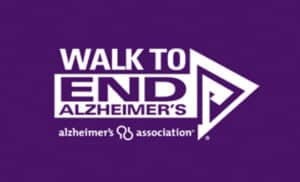You’re Invited: Join the Alzheimer’s Walk With Friends Life Care

This post provides some information about brain health, discusses dementia, and invites you to join the Friends Life Care team that is participating in the Alzheimer Association Walkathon.
Tips to Improve Your Brain Health
Most of us know that physical activity is a valuable part of an overall body wellness plan. But how often do older adults consider their brain in that planning? Studies indicate we can reduce the risk of cognitive decline by choosing key lifestyle habits—such as engaging in regular cardiovascular exercise to elevate the heart rate and increase blood flow to both the brain and body.
cardiovascular exercise to elevate the heart rate and increase blood flow to both the brain and body.
When it comes to improving and preserving brain health, the good news is it’s never too late to start. Making healthy choices at any age is beneficial. Focus on making healthy nutritional choices.
And consider physical activities that may also be mentally or socially engaging, such as walking with a friend, taking a dance class, joining an exercise group or golfing. Taking a holistic approach to your well being can even be fun.
Heed the head-heart connection
According to the National Institutes for Health, there is growing evidence that many factors that increase the risk of heart disease also may increase the risk of dementia. These factors include smoking, obesity, diabetes, high cholesterol and high blood pressure. Seniors and baby boomers can adopt these healthy lifestyle habits for improved heart and brain health:
- Visit your doctor regularly for an annual physical or when you sense a change in your health.
- Get your “numbers” checked, including weight, blood sugar, blood pressure and cholesterol. When needed, actively seek and follow treatment to keep yourself within healthy ranges.
- Stop smoking. If you don’t smoke, don’t start. And, avoid excess alcohol.
- Take action to minimize stress. Studies have found that regular physical activity decreases stress, increases your ability to manage stress and leads to better mood overall.
- Get enough sleep. Inadequate sleep due to conditions like insomnia or sleep apnea can result in problems with memory and thinking.
Take a Walk. And make a difference in your health and in the fight against dementia.
https://www.cdc.gov/aging/aginginfo/alzheimers.htm#AlzheimersDisease?
Thinking about brain health for older adults includes the important topic of Alzheimer’s disease – the most common type of dementia. And  right now, there is no cure. Along with following the tips for holistic health, there is something that you can do to help.
right now, there is no cure. Along with following the tips for holistic health, there is something that you can do to help.
A great way to help improve your cognitive health while making a difference in the fight to end Alzheimer’s is to get involved in the Alzheimer’s Association Walk to End Alzheimer’s®— the world’s largest fundraiser for Alzheimer’s care, support and research. This inspiring event calls on participants of all ages and abilities to join the fight against the disease.
Join our Friends Life Care Team and walk with us at 10AM on Saturday, November 11th at Stanbridge Street Park in East Norriton.
There are just three easy steps to participate:
- Register for a local Walk. Find a Walk near you by visiting alz.org/walk and sign up as a Team Captain, team member or individual. Friends Life Care has a team set up and invites all members and friends to join.
- Start fundraising and spread the word. The Alzheimer’s Association will provide tips and coaching every step of the way, including easy ways to raise funds online.
- Join your area’s Walk day. Come together for an inspiring community event that celebrates our commitment to ending the disease. Bring a friend or come and meet some new friends.
Working together, we can learn about dementia, educate others, and collectively make a difference in the lives of those living with the disease and their family members and friends. To learn more about how to get educated and involved, visit alz.org or call the Alzheimer’s Association 24/7 Helpline at 800.272.3900.
###
About the Alzheimer’s Association
The Alzheimer’s Association is the world’s leading voluntary health organization in Alzheimer’s care, support and research. The Delaware Valley Chapter serves 18 counties in Delaware, South Jersey and Southeastern Pennsylvania, providing programs and services to more than 489,000 individuals and 893,000 caregivers affected by Alzheimer’s disease or other dementia. For more information about Alzheimer’s disease, programs and services and resources, call the Alzheimer’s Association 24/7 Helpline at 800.272.3900 or visit alz.org/delval.
